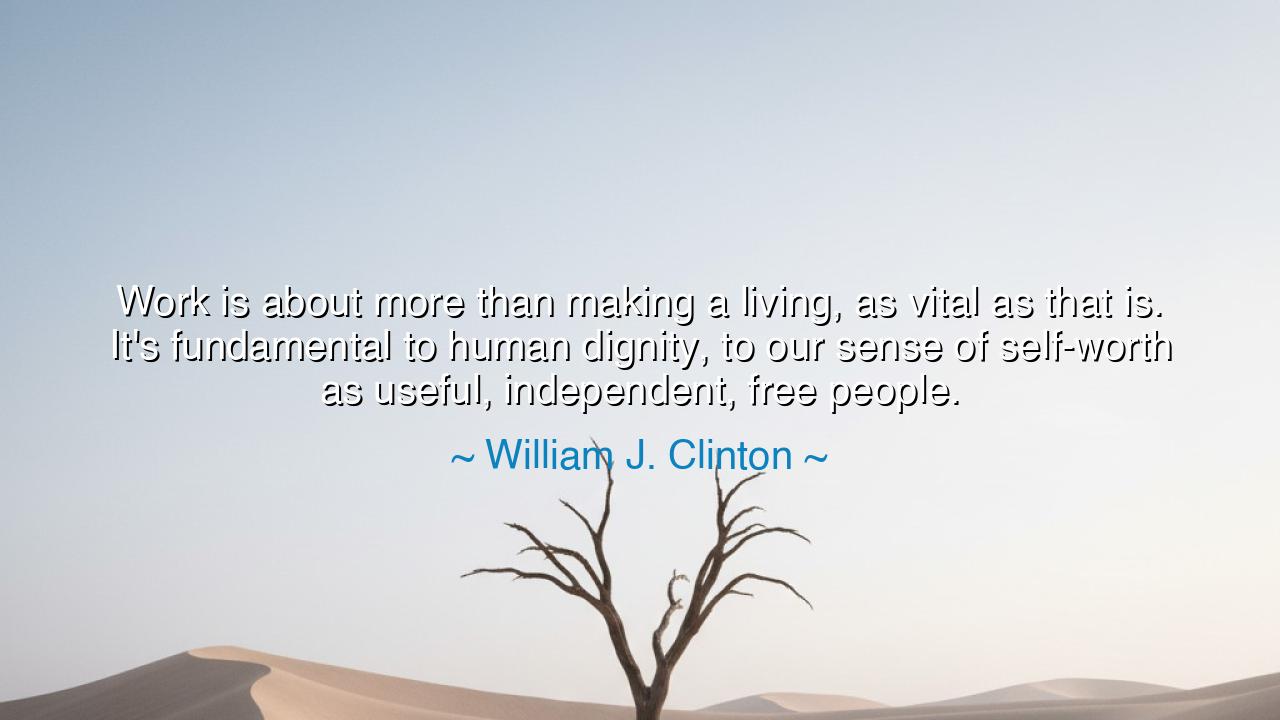
Work is about more than making a living, as vital as that is.
Work is about more than making a living, as vital as that is. It's fundamental to human dignity, to our sense of self-worth as useful, independent, free people.






There are truths so simple that they appear ordinary, yet so profound that they sustain the spirit of civilization itself. When William J. Clinton declared, “Work is about more than making a living, as vital as that is. It’s fundamental to human dignity, to our sense of self-worth as useful, independent, free people,” he spoke not merely as a statesman, but as a philosopher of the human condition. In these words lies the wisdom of ages — that work is not merely the exchange of labor for sustenance, but the sacred act by which a person affirms their dignity, their independence, and their belonging to the world. It is the thread that weaves purpose into existence, transforming life from survival into meaning.
The origin of this truth runs deep in human history. From the dawn of civilization, the work of hands and minds has been both burden and blessing. The farmer who tills the soil, the craftsman who shapes wood or stone, the teacher who enlightens minds — each participates in an ancient covenant between humanity and creation. In labor, man finds both humility and greatness. Clinton, speaking in a modern age of machines and markets, sought to remind his people that in the heart of progress, human worth must never be measured only by income or output, but by the integrity of effort and the joy of contribution. For when a person works, they declare to the universe, “I exist not as a spectator, but as a creator.”
To say that work gives dignity is to recognize its spiritual nature. It is through work that man transcends dependence, that woman claims her freedom, that every individual becomes a participant in the divine act of shaping the world. Even the humblest labor, done with care, carries the nobility of creation. The dignity of work lies not in its grandeur, but in its sincerity — for the heart that works with purpose is already rich. Clinton’s words echo the ancient understanding of labor as sacred, found in every tradition — from the Hebrew scriptures that honored the worker’s rest, to the Greek philosophers who spoke of excellence in action, to the American pioneers who built not only homes, but hope, with their hands.
Yet Clinton also understood the other side of this truth: that to be deprived of work is not only to lose income, but to lose identity. A man or woman without the chance to labor for their own sustenance feels a wound deeper than hunger — the wound of being unneeded. In the industrial age, machines replaced hands; in the modern age, systems sometimes forgot souls. But when work is lost, something more than livelihood fades — self-worth erodes, and the light of independence dims. Thus, his call was not only for economic reform, but for moral renewal: to see employment not as charity, but as empowerment; not as production, but as participation in the shared dignity of being useful.
History is full of lives that embody this truth. Consider Franklin D. Roosevelt’s New Deal, during the Great Depression. Millions of Americans stood idle, not because they lacked will, but because they lacked opportunity. Roosevelt’s programs did more than pay wages; they restored dignity. Men built bridges, women taught children, artists painted murals that still grace public halls. The nation rose not merely from economic ruin, but from spiritual despair. Their work did not just rebuild a country — it rebuilt faith in the meaning of work itself. This is the power Clinton honored: that labor, rightly valued, renews both society and the soul.
In a deeper sense, work is the mirror of freedom. The one who works for their bread works also for their voice — for in labor, independence is forged. A free people are not merely those who vote or speak; they are those who can stand on their own, their worth measured not by privilege, but by contribution. Work teaches discipline, patience, and gratitude — it anchors the restless spirit and ennobles the humble. A person who works well becomes a citizen not just of a nation, but of humanity, joined in the great rhythm of creation.
So, my child, let this truth take root in your heart: work is not punishment, but purpose. Whatever your task — whether grand or small — do it as one who adds light to the world. Seek not only to earn, but to serve, to create, to uplift. For in the sweat of honest effort lies the seed of freedom, and in the dignity of work lies the soul of humanity. Let your labor be not merely for bread, but for becoming — for every stroke of your hand, every act of your will, shapes not only your life, but the very story of mankind. Work, then, not to live — but live so that your work gives life to others. In that, you will find the highest form of independence, and the truest form of freedom.






AAdministratorAdministrator
Welcome, honored guests. Please leave a comment, we will respond soon